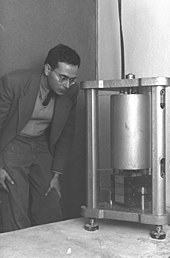Frank Press
Frank Press (born December 4, 1924 in Brooklyn , New York City , New York - † January 29, 2020 in Chapel Hill , North Carolina ) was an American geophysicist .
Life
Press studied at City College of New York (Bachelor in 1944) and at Columbia University , where he made his master's degree in 1946 and received his doctorate in geophysics in 1949. From 1945 he was assistant and later associate professor at Columbia University ( Lamont-Doherty Earth Observatory ) with Maurice Ewing . From 1955 he was Professor of Geophysics at Caltech , at the same time as the seismologists Charles Francis Richter and Hugo Benioff . He was there from 1957 to 1965, succeeding Beno Gutenberg , director of the seismological laboratory. From 1965 he was a professor at the Massachusetts Institute of Technology (MIT), where he headed the Earth and Planetary Science department from 1982. Press cited one reason for the move because he wanted to go into oceanography more. He was a lifelong member of MIT Corporation. He was the principal of the Washington Advisory Group.
From 1981 to 1994 he was President of the National Academy of Sciences and Chairman of the National Research Council. From 1961 to 1964 he was on the Presidential Scientific Advisory Committee of the US President, advised the Arms Control and Disarmament Agency and was involved in the negotiations on the limitation of nuclear weapons tests in Geneva and Moscow. In 1962 he was President of the Seismological Society of America and from 1974 to 1976 of the American Geophysical Union. He also advised NASA, the US Department of Defense and the US Navy. From 1977 to 1981 he was again Scientific Advisor to the President ( Jimmy Carter ) and Director of the Office of Science and Technology Policy.
plant
Press dealt with seismology (including the mechanisms of earthquakes, elastic wave propagation), the internal structure of planets and the moon, structure of the earth's crust and mantle, regional and submarine geophysics. At Columbia University he developed the Press- Ewing seismograph and at Caltech the first digital seismographs were introduced under his direction. Press was a pioneer in the observation of long wavelength earthquake waves and he was involved in the discovery of the free vibrations of the earth as a whole (in the higher modes from the analysis of the Kamchatka earthquake of 1952 and later from the analysis of the Chile earthquake in 1960 ) At the same time several other groups succeeded (at UCLA in the group of J. Freeman Gilbert and a little later in the group of Maurice Ewing at Columbia). He was instrumental in installing a worldwide network of seismographs to monitor the 1963 Nuclear Test-Ban Agreement (with UCLA's Dave Griggs ).
He was the author of a widely used textbook on geology with geologist Raymond Siever .
Honors
- 1972 Arthur L. Day Medal , Geological Society of America
- 1972 Gold Medal, Royal Astronomical Society
- 1979 William Bowie Medal , American Geophysical Union
- 1982 Maurice Ewing Medal (SEG)
- 1993 Pupin Medal from Columbia University
- 1993 Japan Prize
- 1994 National Medal of Science
- 1994 Vannevar Bush Award
- 1997 Lomonosov gold medal
- 2007 Pick and Gavel Award, Association of American State Geologists.
- Order of Merit of the Federal Republic of Germany
- Knight of the Legion of Honor
He was a multiple honorary doctor.
In 1956 he became a Sloan Research Fellow . Press was a foreign member of the Royal Society (1985), a member of the Académie des sciences , the National Academy of Sciences (1958), the American Academy of Arts and Sciences (1966), the American Philosophical Society (1973) and the Russian Academy of Sciences .
In his honor, Mount Press , a mountain in Antarctica, bears his name.
Fonts
- with Raymond Siever , Thomas H. Jordan, Raymond Siever, John P. Grotzinger : Allgemeine Geologie. 5th edition, Spektrum Akademischer Verlag, Heidelberg / Berlin 2008 (original title: Understanding Earth, Freeman, New York, NY, 1993, translated by Volker Schweizer), ISBN 3-8274-1812-7 .
- with Raymond Siever Earth , Freeman, San Francisco 4th edition 1986 (first 1974)
- Earthquake Prediction , Scientific American, May 1975
literature
- Marcia McNutt : Frank Press (1924-2020). In: Science . Volume 367, No. 6482, 2020. P. 1077, doi: 10.1126 / science.abb2626 .
Web links
Individual evidence
- ^ Neil Genzlinger: Frank Press, White House Science Adviser, Is Dead at 95. In: The New York Times , February 1, 2020 (English). Retrieved February 3, 2020.
- ↑ Oral History Interview, Caltech 1983
- ^ Oral History Interview by Press 1983, Caltech
- ↑ Benioff, Press, Stewart Smith Excitation of the free oscillations of the earth by earthquakes , J. Geophys. Res., Vol. 66, 1961, p. 2, Press Observation of free oscillations of the earth , Meeting Abstract, American Geophysical Union, J. Geophys. Res., Vol. 65, 1960, p. 8.
- ↑ Pupin's Medal
| personal data | |
|---|---|
| SURNAME | Press, Frank |
| BRIEF DESCRIPTION | American geophysicist |
| DATE OF BIRTH | 4th December 1924 |
| PLACE OF BIRTH | Brooklyn , New York City , New York |
| DATE OF DEATH | January 29, 2020 |
| Place of death | Chapel Hill , North Carolina |
